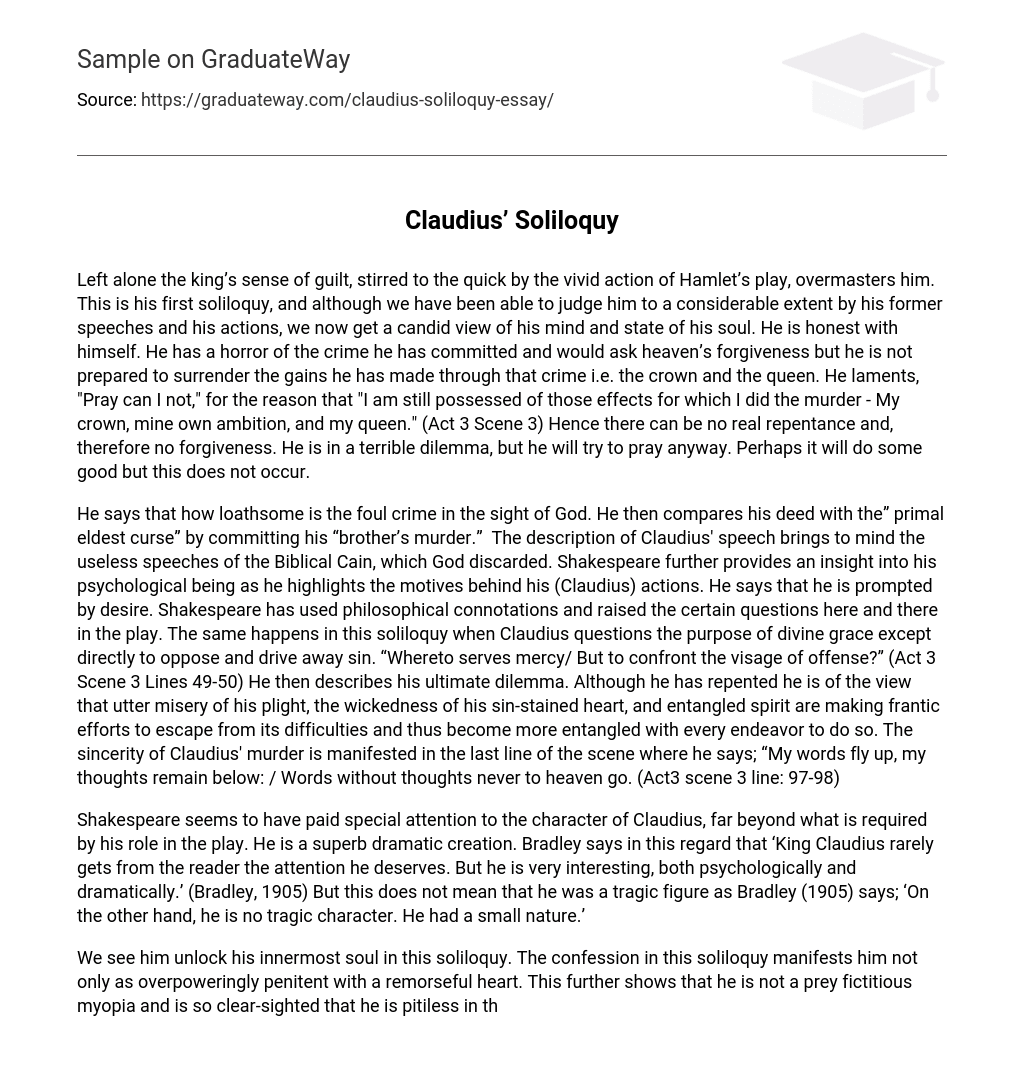Left alone the king’s sense of guilt, stirred to the quick by the vivid action of Hamlet’s play, overmasters him. This is his first soliloquy, and although we have been able to judge him to a considerable extent by his former speeches and his actions, we now get a candid view of his mind and state of his soul. He is honest with himself. He has a horror of the crime he has committed and would ask heaven’s forgiveness but he is not prepared to surrender the gains he has made through that crime i.e. the crown and the queen. He laments, “Pray can I not,” for the reason that “I am still possessed of those effects for which I did the murder – My crown, mine own ambition, and my queen.” (Act 3 Scene 3) Hence there can be no real repentance and, therefore no forgiveness. He is in a terrible dilemma, but he will try to pray anyway. Perhaps it will do some good but this does not occur.
He says that how loathsome is the foul crime in the sight of God. He then compares his deed with the” primal eldest curse” by committing his “brother’s murder.” The description of Claudius’ speech brings to mind the useless speeches of the Biblical Cain, which God discarded. Shakespeare further provides an insight into his psychological being as he highlights the motives behind his (Claudius) actions. He says that he is prompted by desire. Shakespeare has used philosophical connotations and raised the certain questions here and there in the play. The same happens in this soliloquy when Claudius questions the purpose of divine grace except directly to oppose and drive away sin. “Whereto serves mercy/ But to confront the visage of offense?” (Act 3 Scene 3 Lines 49-50) He then describes his ultimate dilemma. Although he has repented he is of the view that utter misery of his plight, the wickedness of his sin-stained heart, and entangled spirit are making frantic efforts to escape from its difficulties and thus become more entangled with every endeavor to do so. The sincerity of Claudius’ murder is manifested in the last line of the scene where he says; “My words fly up, my thoughts remain below: / Words without thoughts never to heaven go. (Act3 scene 3 line: 97-98)
Shakespeare seems to have paid special attention to the character of Claudius, far beyond what is required by his role in the play. He is a superb dramatic creation. Bradley says in this regard that ‘King Claudius rarely gets from the reader the attention he deserves. But he is very interesting, both psychologically and dramatically.’ (Bradley, 1905) But this does not mean that he was a tragic figure as Bradley (1905) says; ‘On the other hand, he is no tragic character. He had a small nature.’
We see him unlock his innermost soul in this soliloquy. The confession in this soliloquy manifests him not only as overpoweringly penitent with a remorseful heart. This further shows that he is not a prey fictitious myopia and is so clear-sighted that he is pitiless in the evaluation of his own crime and of the motives that triggered them. Through this soliloquy Shakespeare portrays him with brushes of realism, revealing a peculiar mixture of good and evil in human nature. Bradley says in this regard that ‘His Claudius conscience, though ineffective, is far from being dead. In spite of its reproaches, he plots new crimes to ensure the prize of the old one; but still, it makes him unhappy’. (Bradley, 1905)
This soliloquy is a result of the dumb-show, especially Hamlet’s interpolation in it. Claudius is cautious of his crime from the very start of the play but remains ignorant of it. This dumb-show aggravates his guilt and he comes to pray to God and seeks repentance. It shows his (Claudius) realization that he can never be exonerated from the offense he has committed. He has completely understood the motives of Hamlet and has conceived rightly that Hamlet intends to harm for the sake of revenge. So “Claudius fears both earthly and divine retribution and in this scene, both are postponed. Hamlet waits until a more suitable time to kill the king, and Claudius finds himself unable to pray with satisfactory results. (Miller, 1995. p. 39)
On the whole, this soliloquy has special importance in the overall structure of the play as the whole play is related to the fact what Hamlet feels about the murder of his father and Claudius’ role in it but this soliloquy provides Claudius feels about his offense. This further illustrates the control of his own self and on his emotions while he is in public. For a renaissance audience, he was criminal in the legal, social, and religious realms but a modern audience can see in him the ambivalence nature typical to humans.
Another important relation of this soliloquy to the overall structure and plot of the play is that Hamlet makes use of Claudius’s prayer as a pretext and justification for the additional holdup in the way to his revenge since his conscience will not permit him to commit planned execution of a praying person. This makes his (Hamlet’s) tragedy inevitable.
References
- Miller, Joanne K. William Shakespeare’s Hamlet. Research & Education Association, U.S. 1995.
- Bradley, A. C. Shakespearean Tragedy: Lectures on Hamlet, Othello, King Lear, Macbeth. 2nd ed. London: Macmillan, 1905.





